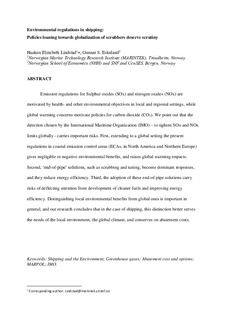Environmental regulations in shipping: Policies leaning towards globalization of scrubbers deserve scrutiny
Peer reviewed, Journal article
Accepted version
Permanent lenke
http://hdl.handle.net/11250/2464819Utgivelsesdato
2016Metadata
Vis full innførselSamlinger
- Articles (FOR) [100]
- Publikasjoner fra CRIStin (NHH) [249]
Originalversjon
Transportation Research Part D: Transport and Environment. 2016, 47 67-76. 10.1016/j.trd.2016.05.004Sammendrag
ABSTRACT Emission regulations for Sulphur oxides (SOx) and nitrogen oxides (NOx) are motivated by health- and other environmental objectives in local and regional settings, while global warming concerns motivate policies for carbon dioxide (CO2). We point out that the direction chosen by the International Maritime Organization (IMO) – to tighten SOx and NOx limits globally - carries important risks. First, extending to a global setting the present regulations in coastal emission control areas (ECAs, in North America and Northern Europe) gives negligible or negative environmental benefits, and raises global warming impacts. Second, ‘end-of-pipe’ solutions, such as scrubbing and tuning, become dominant responses, and they reduce energy efficiency. Third, the adoption of these end-of-pipe solutions carry risks of deflecting attention from development of cleaner fuels and improving energy efficiency. Distinguishing local environmental benefits from global ones is important in general, and our research concludes that in the case of shipping, this distinction better serves the needs of the local environment, the global climate, and conserves on abatement costs.
